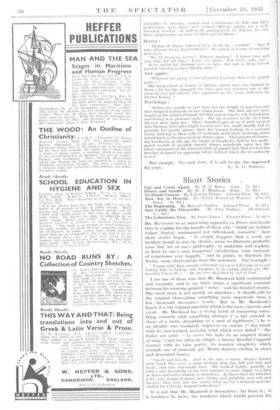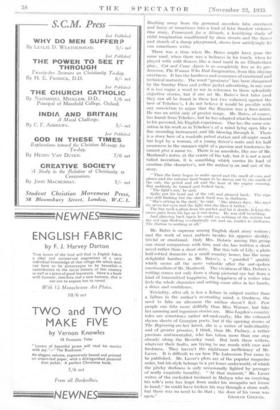Short Stories
Press. 3s. 6d.)
The Laburnum Tree. By James Laver. (Cresset Press. 3s. 6d;) Mn. MANuoon in an interesting appendix to Fierce and Gentle tries to explain for the benefit of those who " think Inc neither vulgar, brutal, sentimental nor ridiculously romantic'' how short stories begin. " It simply happens that a word, au incident heard Or seen by chance, seems to illustrate perfectly some tiny bit of one's philosophy, to underline and explain, at least to one's own tentporary satisfaction, some moment of experience very happily," and he prints, to illustrate his theme, some observations from his notebook. For example : " Tramp with sling outside cathedral, trying to kill a pigeon to eat Taking him to bishop, who happens to N. eating pigeon pie (Bo• member Canon W.). ' Alt, my son. fliey died by act of God.' " I am one of those who' find Mr. Manhood both sentimental and romantic, and to Inc there scents a significant contrast between his amusing pointed " notes " and his finished stories. The short. story is not merely an anecdote ; it should add to the original observation something more important than a few thousand decorative words. But in Mr. Manhood's hands it is the original anecdote which is the more vigorous and vivid. Mr. Manhood has a trying habit of comparing some-. - thing concrete with something abstract (" a bat entered in chase of a moth, disturbing as a seed of nightmare,") he is an idealist who resolutely improves on nature (" day-break with its star-washed, reviving wind which never failed "—the italics are mine---" to move the larks to an inspired frenzy of song,") and too often lie adopts a breezy fanciful Coppard manner with its false poetry, its country simplicity which reminds one of earnestly gay Morris dancers circling in shoes and decorated braces.
" Sweet and Lovely. And so she was, a merry, slender beauty with frank blue eyes, a clear, glowing skin, lips full and rich and lively, and true sun-smoke hair. She walked lightly, jauntily, as with a sure knowledge of the best summer to come, happy as a bird at dawn and with a whistle as melodious. In those days she whistled 101. I my scraps of tunes, now tricksy and sprightly, now soft and • dreamy, that were like fine satin§ tried on for a moment and dis-
carded for a lovely, languid nakedness." • - It is not that Mr. Manhood is insensitive ; far from it ; it is hardness he lacks, the hardness which would prevent his
flinching away from the germinal anecdote into sweetness
and fancy or sometimes into a kind of false Sandow violence.' One story, Framework for a ,Miracle, a horrifying study of
child imagination conditioned' by slum streets and the fumes and stench of a dump playground, shows how satisfyingly can sometimes write.
There was a time when .Mr- Bates. might have gone the same road, when there was a lushness in his touch; When he played with wild flowers like a mad maid in an Elizabethan Cut and Come Again is as completely free as its pre- decessor, 7'he Woman Who Had Imagination, from this cloying sweetness. It has the hardness and assurance of emotional and technical maturity. The word "greatness" has been cheapened by the Sunday Press and yellow jacket advertising, in any case it is too vague a word to use in reference to these splendidly objective stories, but if one set Mr. Bates's best tales (and they can all be found in these last two volumes) against the • best of Tchehov's, I do not believe it ivould'be possible with any conviction to argue that the Hessian was a finer artist.
He was an artist only of greater range. Mr. Bates, of has has learnt from Tehehov,• but he has adapted what he has learnt to his personal, his English experience. One has the same sen- sation in his work as in,Tehehov's of a mind lying open like a fine recording instrument, and life blowing through it. There is a story here of a roadside petrol station and all-night snack bar kept by a woman, of a young driver's mate and his half awareness in the summer night of a passion and tenderness he cannot give a name to. There is an anecdote; like one of Mr. Manhood's notes, at the centre of the tale, but it is not a neat tidied invention, it is something which carries its load of emotion (the character's, not the author's) on and out of the story.
the lorry began to make speed and the smell of corn and plums and the summer land began to be driven out by the smells of the cab, the petrol and oil and the heat of the engine running. But suddenly he turned and looked back.
' The light's out,' he said. Spike put his head nut, of the cab and glanced back. The sign was still flashing but i he shack itself was in darkness.
She's sitting in the dark, he said. She always does. She sayS its saves her eyes and i Ile light and she likes it better.' . .
The boy took a pinta frOlkl his pocket and bit it slowly, licking time sweet juice from his lips as it ran down. He was still trembling.
And glancing back again he could see nothing of the station but the red sign Hashing everlastingly out and on, scarlet to darkness, The Station to nothing at all."
Mr. Bates is supreme among English short story writers ; and the work of most authors besides his appears shoddy, trivial or emotional. Only Mrs. Dobree among this group can stand comparison with him, and she has written a short novel rather than a short story. But this tale of Lily, a plain half-witted.domestie in a small country house, has the same delightful • hardness as Mr. Bates's, a " guarded " quality which seems all the more valuable after the out-spoken emotionalism of Mr. Manhood. The vividness of Mrs. Dobrde's writing conies not only from a sharp pictorial eye but from a kind of transmitted happiness, the happiness of a writer who feels the whole character and setting come alive in her hands, a drive and confidence.
Triviality, after all, is less a failure in subject matter than a failure in the author's re-creating mind, a tiredness, the
need to fake an aliveness the author doesn't feel. . Few
• .people can fake more skilfully than Miss Warner, but fake
her amusing and ingenious stories are. Miss Lagden's country tales are sometimes rather art-and-crafty, like the coloured rhyme sheets of Georgian poets, but if the opening stories of The Beginning are her latest, she is a writer of individuality and of greater promise, I think, than Mr. Pudney, a rather precious sentimentalist, who has taken more than one step already along. the Beverley road. But both these writers, whatever their faults, are trying to use words with care and freshness. They haven't the nightmare inefficiency of Mr. LaVer. It is difficult to see how The Laburnum Tree came to be published. Mr. Laver's plots are of the popular magazine order; but his style belongs to a yet lower underworld, of which the pitchy darkness is only occasionally lighted by passages of really exquisite banality. " At that moment," Mr. Laver writes of the cuckolded husband in Malaya who on receiving his wife's note has leapt from under his mosquito net kreese in hand," he could have broken his way through a stone wall; but there was no need to do that ; the door of his room was































































































 Previous page
Previous page